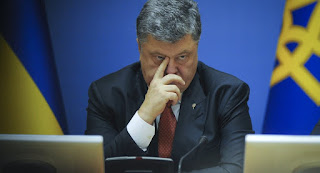April 14, 2016 (UNIAN) The Verkhovna Rada of Ukraine on Thursday
appointed Parliament Speaker Volodymyr Groysman to the post of Prime Minister
of Ukraine, having dismissed from this post Arseniy Yatsenyuk.
Then the Verkhovna Rada adopted a resolution on the formation of the Cabinet of
Ministers. According to UNIAN, voted 239 deputies out of 367
MPs registered in the session hall voted for the move. As noted by Rada Speaker
Andriy Parubiy, the motion proposes appointment of nominations offered by
President Poroshenko (meaning, candidates for the posts of Defense Minister and
Foreign Minister), and the candidates promoted by Prime Minister Groysman. The
proposed composition of a new Cabinet was personally voiced by PM
Groysman at the session hall. “I’d like for it to be the government,
which, having your support, would return confidence of the people in the
authorities in general,” said Groysman.
The following officials were named:
Stepan Kubiv is to become First Deputy Prime Minister – Minister of
Economic Development and Trade (Presidential envoy in parliament, MP);
Deputy Prime Minister – Volodymyr Kistion (first deputy chief of staff
in Rada);
Deputy Prime Minister for European and EuroAtlantic Integration – Ivanna
Klympush-Tsintsadze (first deputy chief of Rada Committee on Foreign Affairs,
MP);
Deputy Prime Minister – Pavlo Rozenko (Minister of Social Policy in
Yatsenyuk’s government);
Deputy Prime Minister for Humanitarian Affairs – Vyacheslav Kyrylenko
(Minister of Culture in Yatsenyuk’s government);
Deputy Prime Minister - Minister of Regional Development, Construction
and Housing – Gennadiy Zubko (retains his post);
Minister of the Cabinet of Ministers – Oleksandr Saenko (Rada’s chief of
staff);
Finance Minister – Oleksandr Danylyuk (former adviser to Viktor
Yanukovych; headed the coordination center on implementation of economic
reforms since 2010; in July 2014 appointed representative of Petro Poroshenko
to the Cabinet; in September 2015, the president appointed him Deputy Head of
Presidential Administration)
Interior Minister – Arsen Avakov (retains his post);
Justice Minister – Pavlo Petrenko (retains his post);
Defense Minister – Stepan Poltorak (retains his post);
Foreign Minister – Pavlo Klimkin (retains his post);
Minister of Social Policy – Andriy Reva (Deputy Mayor of Vinnytsia);
Youth and Sports Minister – Ihor Zhdanov (retains his post);
Minister of Information Policy – Yuriy Stets (retains his post);
Ecology Minister – Ostap Semerak (minister of Yatsenyuk’s Cabinet, MP,
first deputy of Rada Committee on Euro integration);
Minister of Education – Liliya Hrynevych (Chairman of Rada Committee on
science and education, MP);
Minister of Agrarian Policy and Food – Taras Kutoviy (head of Rada’s
Committee on Agriculture and Land, Deputy chief of BPP faction);
Infrastructure Minister – Volodymyr Omelyan (Deputy Infrastructure
Minister in Yatsenyuk’s government);
Culture Minister – Yevhen Nyshchuk (Deputy Minister of Infrastructure in
Yatsenyuk’s government);
Minister on temporarily occupied territories and IDPs – Vadym Chernysh
(expert on fighting money laundering and financing terrorism, member of ACAMS –
Association of Certified Anti-Money Laundering Specialists) since May 2010);
Minister of Energy and Coal Industry – Ihor Nasalik (between April 2002
and March 2005 – MP, used to be chairman of subcommittee on oil industry and
petroleum products supply of the Rada Committee on fuel and energy complex,
nuclear policy and nuclear security).
At the same time, the nomination for the post of Minister of Health has
not been voiced.
After this, the ministers vowed allegiance as Groysman voiced it from
the rostrum.










